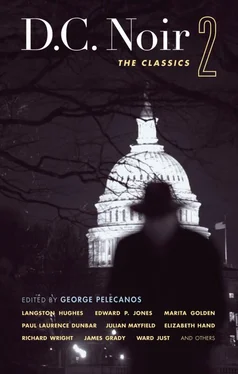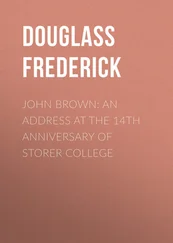“Stop the presses,” I said.
“Would you like to have that? For your very own?”
“Are you under the Official Secrets Act?”
“I’ll send it over by messenger.”
“Are you serious?” I suspected a joke.
“Yes,” she said, and rang off.
The document arrived that afternoon, and when I gave it to Gottschault he whooped with pleasure and literally did stop the presses to get it in the newsletter. Then he gave me a twenty-dollar bonus, but when I asked Nora to dinner to celebrate, she declined.
I don’t remember when she started calling me “friend.” It was probably the period when she began dropping in at my apartment unannounced. This was a two-room apartment in a brownstone off Connecticut Avenue. I’d know she was there when I heard the phonograph; Brahms if she was in a good mood, Bunk Johnson if she was not. She’d taken to American jazz along with everything else and loved to listen to the blues when she was low. I worked in my bedroom and would finish whatever passage I was writing and join her and we’d sit and talk, sometimes all night. Washington politicians fascinated her, she thought they had nothing in common with the ones she knew in Britain. She came to modify that opinion, but in the first months in Washington she was as intrigued as a biologist investigating a new species. Nora developed categories for the politicians that she met.
It was clear from the first month that there would be no romance. I was never exactly sure why. She seemed to want a friend, someone off the Washington political circuit, who was compatible and what she called “talkable.” I was pleased and flattered — romance or no — because I was being very reclusive and difficult at that time of my life, and Nora was one of the ornaments of Washington. She had her own center of gravity, a distinct and (I thought) hard-won personal style. Late at night we tried to analyze the town, what made it work, why some men were successful and others were not, why women seemed to fail, and what each had to do with the other.
A couple of times a month she’d give me a document or memcon — she’d picked up government slang, a “memcon” is a memorandum of conversation — and as a result of that I was a boon to Gottschault. Now he was paying me a hundred and twenty-five dollars a week, plus a thirty-dollar bonus for really important items. Items that were exclusive. Because of Nora’s tips, Gottschault had become very popular at the National Press Club bar. It was clear to everyone that he had inside information, “inside skinny,” as Nora called it. I enjoyed the extra money, but more than that I enjoyed Nora. I’d wait for her unannounced visits, when we’d sit and drink coffee or beer and talk. The longer she stayed in Washington, the more doubts she had about America; but she never regretted leaving London. Of course she was by then one of the best-known foreign correspondents in town. Her copy was nothing much to read because of the form in which she was obliged to write. The editor of her paper had a theory that no paragraph should be longer than two sentences, no sentence longer than ten words, and no word longer than three syllables. Once she wrote a two-hundred-word political story entirely in haiku, but her foreign desk mixed up the paragraphing so it came out wrong. But it was a noble effort, and (as a matter of fact) excellent haiku.
It was partly Nora’s encouragement that gained me my first real sale, a story to the Saturday Evening Post for eight hundred dollars. I’d received word in the morning and immediately rang her up at her office. But she’d gone. I was agitated the rest of the day, because I wanted to share this news with her. I’d been working on fiction for two years and this was the first evidence I had that I could sell my stories for money. I felt wonderful and spent most of the day congratulating myself that I hadn’t “cheated” or “lowered my standards” or pandered to “the popular taste.” I had eight hundred dollars and virtue, too. At four in the afternoon, I heard the phonograph. Bunk Johnson.
I opened the bedroom door right away and saw Nora sitting on the couch. It had taken me four months to write the story, Nora had followed it from the beginning. I trusted her absolutely, and now I looked at her and grinned and told her I’d sold the story and mentioned the amount. She knew everything about it, including how difficult the writing had been. I was certain that with this story behind me, I’d fly. “Nora, it’s really going to move now. The bastards can’t ignore me any longer,” I said, and scooped her up in my arms. She was so tiny and light it was like lifting a doll. She put her arms around my neck and kissed me on the cheek. She was crying, and I began to laugh.
“Oh, come on. No tears. Think of this, a real sale. Money. I’ve the letter right here. They really like it. They’re thinking of putting my name on the cover of the magazine. Do you know how many copies they sell a week? Five or six million copies.” I held her tightly and laughed. “Every dentist in America reads the Saturday Evening Post .”
When I put her down she was still crying. I started to say something funny, but understood then that the tears had nothing to do with me or the magazine. There was something frightening to me about Nora in tears, Nora hurt with no visible wounds. She cried without covering her eyes.
She stopped crying after a minute, and I went into the kitchen and made tea. She was sitting quietly in the middle of the sofa, a bleak look on her face, her hands in her lap, listening to Bunk Johnson. We had become very close over the six months, and I had a strong protective instinct toward her; it was partly fatherly, and strongly sexual. She had been the one encouraging me, and now I wanted to help her. I thought she was too strong to be hurt that badly by anyone.
“Do you want to talk?”
She shook her head.
“Drink your tea,” I said.
She held the cup in both hands, sipping the tea.
“Trouble,” she said.
“A man?”
She nodded, yes.
She was involved with someone, and I knew it was serious. She was the only woman in Washington who took sex seriously enough to be private about it. She had her own standards, which were uninhibited and seemed to me healthy; she said she loved the pleasure that sex gave her and never confused that with anything else. Beyond that, she was discreet. From time to time she stayed at my apartment, although we never slept together; different stars, wrong chemistry, she said. Those nights she was usually in flight from a bore or a sponge. She was cheerful about it, acknowledging that sometimes she picked the wrong man, and vice versa. But Nora’s life was not an open book.
“Well, I’m a mess today.”
I wanted desperately to say the right thing. She had always encouraged me when I needed encouragement, and I felt very much in her debt. I knew right away that this had something to do with her current liaison, the details of which I knew practically nothing.
“You tell me what you want to tell me,” I said, as gently as I could.
“I have to write a story this afternoon.”
“Well, I’ll write the story. You tell me what it’s about, and I’ll write it. Then you can rest for a bit and tell me what you want to tell me later.”
She smiled at that: “Friend, you can’t write a story for my paper. You don’t know how, your sentences are too long. Won’t work.”
“I’ll cable London and tell them that you’ve got the flu.”
“Would you do that?”
“Of course.”
“No need to cable, just call Judson.” Judson was the bureau chief, the man she worked for.
I telephoned, Judson was out, so I left word with the answering service. Then I went to Nora, who was stretched out full-length on the couch. It took an hour to get the essentials out of her, but I still didn’t have the man’s name. It didn’t matter to me who he was, except from one or two things she said I gathered he was someone important. She told me the usual things, what he was like, what they talked about, how they’d met, what he meant to her, and how it was ended. It was “permanent,” she said, but ended. He wanted to get a divorce from his wife, and that was the last — definitely the last — thing she wanted. It would ruin his career, and he would be no good at anything else. She would become an ego doctor, and she wanted no part of that; she saw it as martyrdom and it seemed to her wrong. If you’re an architect or a lawyer and you get into trouble, you can resign and go practice somewhere else. If you’re a politician and get into trouble, that’s the end of it.
Читать дальше











